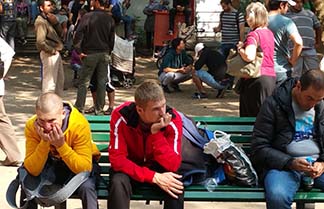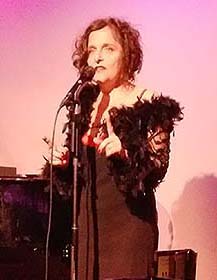Theater
John Doyle‘s staging of “The Color Purple” is a hokey take on Marsha Norman‘s dramatization of the Alice Walker novel about a young black woman in a society of predatory black men. Musical vignettes in jazz, gospel, ragtime and blues make this a visual chamber opera rather than a story play. The production numbers are appealing, the performers are very fine, so it works as opera. But as drama, the story lacks subtlety.
Theater
In Arthur Miller‘s tragedy of poverty and patriarchy, director Ivo Van Hove strips out the naturalism of sets and real entrances and exits, so you have just the sense of primal actors. Is that why they wear street clothes but go barefoot? To remind us of the natural animal? (Otherwise it‘s an affectation.)
The surreal sense begins with the pinkish light that suffuses the stage when longshoremen Eddie (a riveting and tragic Mark Strong) and Louis (Richard Hansell) appear after a hard day at the docks. There is chorale music in the background. They are in Red Hook, Brooklyn.
Uncategorized
Following their 2013 Drama Desk nominated “Le Jazz Hot: How the French Saved Jazz,” the brothers Peter and Will Anderson are back with another video and music show, this one about jazz greats Count Basie and Duke Ellington. Featured in “Le Jazz Hot,” Ellington was one of America‘s black jazz musicians who went to France beginning in the 1920s, because the French were a lot more hospitable to them than were Americans.
Uncategorized
Pilobolus takes dance theater to a new dimension, transforming the performers to silhouetted figures behind a screen, using body artistry to turn dancers into shadows of elephants, café tables, lobsters and a centaur.
It‘s a clever device that fascinates, though sometimes it seems more like mime or kinetic poses than dance.
Uncategorized
I went to an art opening the other day and discovered the modernization of the ancient art of repoussé. Plus a prominent artist who does political art. All at the new West Broadway Gallery in Soho, in New York City, in an exhibit called American Realism Today.
Robert Lobe has for years created unusual sculptures, presented outdoors and in galleries, that use natural rocks, logs, leaves, and the like as the basis of metal sculptures.
Theater
A play one could expect to be very silly turns out to be entertaining, largely due to the smart acting of Annaleigh Ashford as a dog and the quirky light touch of director Daniel Sullivan. My companion was an actress who remembers how hard it was in acting classes to play such anthropomorphic characters. Ashford succeeds brilliantly, being at various times pert, bitchy, sexy and – well anything a human could be. But as I thought about that, I had some concerns.
Theater
If you take Mike Bartlett‘s “King Charles III” as the possible future, it makes no sense. But if you take it as a story of hubris and betrayal connected to a critique of British elites, it‘s right in the realm of current real-life political theater.
It follows the Shakespearean tradition of plays as grand political dramas. In fact, the actors speak in rhyming couplets and sometimes bear resemblances to the Bard‘s iconic characters.
Theater
Theater as investigative reporting or investigative reporting as theater, however you cut it, Mark Thomas, a British TV actor/comedian and activist has created a fascinating show. It‘s by him and about him: how he ran stings that put some illegal arms traffickers out of business or in jail and how he was deceived and betrayed by a “comrade” who turned out to be a spy for BAE Systems, the UK‘s largest aerospace and weapons company. Oh, and one must mention that all of this has led to hearings by a committee of Parliament into corporate spying on British citizens. So, even before the reviews on this theatrical exposé came in, Thomas had won.
Theater
Pinter is a wonderful trickster, playing games with the audience as they watch characters on the stage playing games with each other. This one is about memory, or imagining, or both. And the actors — Clive Owen, Eve Best and Kelly Reilly — pull it off and pull the audience in subtly, as if they were hardly trying. Credit director Douglas Hodge getting the mystery right on.
Deeley (Owen) and Kate (Reilly) are a married couple living in the country, a ways from London. Anna (Best) arrives for a visit. But the start is curious. Anna is wearing an elegant cocktail dress with a halter top and open back, very high heels, not what you‘d wear to dinner at the country house of middle class friends.
Theater
In this stunning artistic and feminist biography of Elizabeth I, Karen Coonrod tells us what most of us never knew about that 16th-century British monarch. She was first of all very, very smart, in politics. She was also studied and intelligent, poetic in her speaking and writing, and a polyglot – we hear her speak Italian, Spanish, German. She was subtle, but tough when it mattered. From Coonrod’s plays, built from Elizabeth’letters, speeches, poems, and prayers, you feel you are meeting an amazing woman!
The play starts with four gold high ladder-backed chairs set within a red rectangle painted on a black floor.Four woman arrive, in steel gray or silver or black gowns. There‘s a background noise like radio interference, or is it a mob?
Cabaret & Jazz

Jazzy tunes reached the best notes at the annual New York Cabaret Convention sponsored by the Mabel Mercer Foundation, whose artistic director KT Sullivan is a major cabaret singer herself. This was the 26th, and over four evenings it brought major American singers to Town Hall. There were about 60 performers. I was there the last three nights, October 14-16, 2015, and attempt here to acknowledge the best.
Theater
Cloud Nine, of course, is that place of ecstasy in the metaphorical sky where love and/or sex takes one.
Caryl Churchill‘s 1979 play is a quirky la ronde set in Africa in 19th-century Victorian times and London in 1979. Except that most of the characters of the second half are the same as the first, played by different actors. And compressing time, the events of Act 2 take place only 25 years later.
The wit of the first part, skewering British imperialism, racism, sexism, makes the cartoon empire and its inhabitants bitingly funny. Director James Macdonald paints the satire with delicate brush strokes.
Theater
Desire is a collection of plays by modern writers who base the works on Tennessee Williams short stories dealing with various aspects of sexual desire, beginning with young first love, moving through various aspects of homosexuality, touching on repressed desire, and finishing with a full blown graphic orgasm. Most are at least interesting, a few are stand-outs, and a couple should have been left between book covers. The performances by members of The Acting Company are excellent.
Blog, Reporting

Sept 21, 2015 – Before the refugee crisis exploded in September, there were already people seeking help in Germany. On August 19th, I visited a reception center in Berlin, taken there by Karsten Voigt, who as a Social Democratic member of parliament had for decades led SPD foreign policy there.
Longtime friends since I first reported about Germany in 1979, I had had lunch with him. And after that he said, “I want to take you someplace.”
So we walked along Turmstrasse in Moabit, the neighborhood where he lives. We arrived at “Lageso,” acronym for Landesamt für Gesundheit und Soziales. Office for Social and Health Services. It was originally a place where people got health services.
Cabaret & Jazz

When Julie Reyburn sings, you think you are at a theater stage. Her rich soprano last night entranced an audience at her “Fate is Kind,” a show of mostly kids‘ songs for adults. I liked her charming take on Frank Loesser‘s “The Ugly Duckling.”
I was glad, as it turned out, that not all “kids‘ songs” are for kids, especially when they are “On the Steps of the Palace” from Into the Woods by Stephen Sondheim. Reyburn is a tuneful theatrical Sondheim interpreter.
Her performance was happily accompanied by the jazzy piano of music director Mark Janus.
Theater
In the mid-19th century, the King of Siam, now called Thailand, was struggling to modernize his country. Much of the struggle was against himself. He was a despot who thought of himself as a god. He had numerous wives and everyone — wives, children, commoners — had to keep their heads lower than his, even if it meant prostrating themselves. And King Mongkut had slaves.
Theater
If cleverness is next to godliness, Jim Parsons soars on both counts. His send-up of religion, believers and politicians is a holy hoot.
Parsons wears a white robe over slim black pants and red sneakers and speaks avuncularly with the slight southern accent he picked up in his native Houston.
Theater
It‘s the end of World War II, Liberation in Paris. Former soldier Jerry Mulligan (Robert Fairchild), a New Yorker who wants to be a painter, stays. This modern jazz ballet with brilliant music by George Gershwin and unforgettable lyrics by Ira Gershwin is wrapped around a story inspired by a 1951 movie. Jerry becomes friends with Adam Hochberg (Brandon Uranowitz), a very NY-accented pianist and composer who hits the keys at the Dutois café. Uranowitz is a charmer, It‘s still a dark time in the city of light, there‘s hunger. The men find rooms at a hotel where artists don‘t get charged.
Theater
Part operetta, part farce, part screwball comedy, this musical revival is about the behind-the-scenes relationship of Lily Garland (Kristin Chenoweth), a temperamental actress, and Oscar Jaffee (Peter Gallagher), a bankrupt theater producer. On a luxury train traveling from Chicago to New York, Oscar tries to cajole the glamorous Hollywood star, once his protegée, into playing the lead in a not-yet-written drama, and perhaps into rekindling their romance.
Theater
The opening of Shakespeare’s The Tempest is powerful and realistic. The thunder shudders, the lightening flickers, water mists up through a ship’s floor boards, passengers and crew list and fall. A couple left the theater with a very young son whose face showed real fear.
The scene depicts the power of natural forces. But in this case, the power is supernatural. Because the storm has been conjured up by Prospero, former Duke of Milan, exiled to a remote island, who with the help of a magic cape is getting back at the king and brother who betrayed him. He has shipwrecked them on his island.
Cabaret & Jazz

Nathalie Schmidt is a French cabaret singer – and a playwright and screenwriter, theater and film director, artist and actress in plays by Shakespeare, Racine, Sartre and other European classics. A full creative life.
You see a lot of that talent in her cabaret show, Forgotten Lovers, at the Metropolitan Room. Certainly, her acting enriches a partly comic, partly cynical take on life. As a singer, she hits the right high notes, and she often sounds like Piaf. She‘s a personality that the New York cabaret scene needs.
Theater
Political satire is often the best political commentary. Take the superb sketch musical comedy by Paul Hodge and Michael Hodge, which skewers Democrats and Republicans with equally well-aimed barbs.
The clever device is that two actors play Bill Clinton, the older, wiser William (Tom Galantich) and the young roué, Billy (a very good Duke LaFoon) to show us the two sides of his personality. There‘s only one Hillary, but Kerry Butler has enough talent for two.
Theater
The set is Art Deco inspired by the Grand Palais in Paris. It‘s the Belle Époque of the early 1900s. But how belle depends on how you look at it.
The 1944 Colette story on which the play is based is about the demi-monde of Paris, where elegant courtesans with their rich lovers dined out at Maxim’s, drinking Veuve Cliquot and flicking their gowns and feathers.
Theater
This play may be about the 16th century, but the dialogue, the politics, the economics, the power struggles give you a sense of watching the mafia.
Except that rather than focus on money, we are watching the dramatic repercussions of King Henry VIII‘s desire to get a wife who will give him a male heir.
Theater
When the music is by John Kander and the lyrics by Fred Ebb, you think dark. “Chicago,” “Cabaret,” “Kiss of the Spiderwoman.” “The Visit” fits perfectly into that very satisfying canon. This is a stunning production, with director John Doyle using the musical pieces to build the psychological and intellectual tension.
The story is shadowy and shocking, a political fantasy based on the 1956 play by the Swiss Friedrich Dürrenmatt. Writing soon after the end of World War II, he crafted this as a morality tale for our times. Now it‘s a chamber opera.





